7 Things That INFJs Experience as Children
INFJ children are a rare and unusual breed. They make up less than 1% of the US population, and often report having felt “odd”, “misunderstood”, or ostracized as children. That’s why I think it’s especially important to have a grasp of what it feels like being in an INFJ child’s mind. If we can take the time to understand these children then we can improve their chances of accepting themselves and reaching their potential.
Not sure what your child’s personality type is? Take our new questionnaire here!
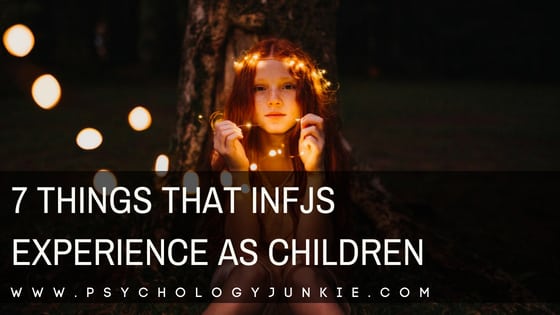
This article contains affiliate links. I only recommend products I truly believe in.
Table of contents
Estimated reading time: 9 minutes
7 Things That INFJs Experience As Children
#1 – A Hesitancy To Accept Things at Face-Value
While the rest of the world seems to step out into their environment with certainty, easily believing that they will be supported by the walls, floors, and structures around them, INFJs second-guess everything. What is an illusion and what is real? What is the meaning beyond these concrete, tangible items? They want to transcend the material world, look beyond the senses, and beyond the limits of time itself to understand the over-arching meaning of everything. While most other children are focused on what’s happening now, INFJs are trying to figure out what “now” is in relation to everything else. In fact, what does it even mean to exist in “the now”?
Childhood can be a magical time for any personality type. All children are blessed with imagination, and they are all still trying to figure out what’s real and what’s not. But INFJs tend to take longer than other types, especially sensing types, to discern what’s real and what’s not. It’s not unusual for INFJs to report that as children they wondered ceaselessly about the nature of reality and what their place was in the theater of life. What holds the earth in the sky? Why is it held there? Why was I brought into existence? INFJ children tend to take the role of “miniature philosopher” very seriously.
#2 – A Desire to Decode Dreams
While other children might be happy with the whole “dreams don’t make sense and that’s okay” line, INFJs don’t usually subscribe to that. Introverted Intuition, the preferred mental process of the INFJ, is all ABOUT unconscious symbols and imagery…that’s right, the stuff you find in dreams.
In the words of depth typologists Leona Haas and Mark Hunziker,
“Introverted Intuiting is the keeper of the so-called sixth sense. Unexplainable information can take the form of hunches, clairvoyance, abstract intuition, and messages from the unconscious.”
Also…
“Introverted intuiting is the only perception process that is independent of the conscious mind.”
– Leona Haas and Mark Hunziker, Building Blocks of Personality
Now I’m not saying INFJs are psychic, although many experience strange feelings that seem psychic. There’s nearly always a reasonable explanation for those feelings, though.
Dreams, however, are taken very seriously by young INFJs. They analyze the symbols, the images, the underlying themes, and look for messages that might be important to them. In fact, Carl Jung, the founder of personality psychology, referred to introverted intuitives as “the mystical dreamers and seers” of the world.
#3 – A Strong Understanding of Other People’s Emotions
INFJs are extremely affected by harmony, conflict, stress, or anger. They are very empathetic children and are particularly tuned into the emotional environment of their families or classrooms. One of the reasons they enjoy solitude so much is because they can separate themselves from the overwhelming emotions of other people. ]
INFJs tend to feel responsible for other people’s feelings like they have to “fix it” if things are bad. This is thanks in part to their auxiliary function, Extraverted Feeling. At a young age, this function isn’t very well-developed yet, so it feels overwhelming and stressful for young INFJs to tap into frequently.
Psychologist David Keirsey says of INFJs,
“This type of Idealist has strong empathic abilities and can become aware of another’s emotions or intentions – good or evil – even before that person is conscious of them. Such mind-reading can take the form of feeling the hidden distress or illnesses of others to an extent which is difficult for other types to comprehend.”
– David Keirsey, Please Understand Me
Young INFJs are so conscious of how other people are feeling that they can have difficulty understanding how they themselves feel. At times, this empathy can be a gift. They may know just what’s bothering someone and what to say to encourage them. Other times it can be a curse, and they can feel overwhelmed by emotions they don’t understand because they aren’t their own.
This is one of the reasons it’s very important for parents of INFJs to give them plenty of alone time and to keep the environment as conflict-free as possible.
#4 – Distraction
INFJs are drawn to complexity on a constant basis. Remember how I said they don’t take anything at face value? Well, that certainly applies to their interactions with people. INFJs analyze what people are saying to them, always looking for hidden intentions, meanings, symbols, and significance. And if they’re on their own they can get so lost in their imagination that the outer world becomes silent to them.
This can mean that one of two things happen when you’re talking to them:
1 – The young INFJ is so focused on analyzing what you said in the first two minutes of the conversation that they lost track of what you’re currently talking about.
2 – If they are playing on their own, they can be so lost in their imagination and ideas that they didn’t realize you said something to them or gave them a direction. This adds up to them being very confused fifteen minutes later when you said, “but I TOLD you to come in for dinner!”
#5 – Intense Frustration Over Interruptions
INFJs have a difficult time switching gears in childhood and adulthood. They like to fully immerse themselves in what they’re doing. They frequently get into a meditative, calm, focused state when they are analyzing, creating, or imagining. It’s as if the rest of the world goes quiet and everything seems peaceful yet alive. When someone bursts in on them during these times, they can seem annoyed, irritated, or overwhelmed. They may cast off their normally kind-hearted disposition and seem surprisingly harsh or sarcastic. That’s because when they’re in these states they are usually tapped into their dominant function, Introverted Intuition, NOT their feeling function, which comes second.
Basically, it takes them a while to revert back to the “I’m around people, so I better tap into their feelings and their needs” phase.
#6 – Perfectionism
If you see a young INFJ repeatedly balling up the story they are writing, tossing it in the trash, and scowling furiously, then you might have caught a glimpse of INFJ perfectionism. Young INFJs have extremely idealistic hopes for the projects they create. Bringing their ideas out into the world is often stressful and time-consuming for them. They feel that the real thing “must” live up to their idealized image. It doesn’t help that they tend to have complicated, substantive projects in mind and not simple ones. They can re-work, throw away, modify, adjust, and correct their project so many times that they end up in a state of exhaustion.
If you’re the parent of an INFJ, it’s important to give them some space when they’re working creatively. If they’re not happy with what they’re doing, continue to give them space, even if you feel like you must step in. INFJs tend to be very sensitive about their work and won’t want feedback until they are ready to ask for it. And they will ask when they are ready most of the time. When they do ask for feedback, try to be as positive as possible and give specific compliments, not generalized ones. If they want suggestions, be sure to mix criticism with praise for what they are doing well.
Related: The INFJ Workaholic
#7 – Loneliness
Young INFJs soon discover that most of the world doesn’t operate in the same way that they do. Not every other child wonders about the nature of reality, why they exist, what this symbol means for that future, or what will happen in 50-100 years. Not everyone gets these sudden “hunches” about what will happen that they can’t explain because it hasn’t sorted itself out yet. INFJ visions, so clear inside their mind, often come across as halting or rambling in person. They may feel they know something very strongly and feel as if they must tell someone about it, but then be met with ridicule, skepticism, or mocking when they finally do.
Almost every INFJ I’ve spoken with has at one point in their lives come to a realization that their way of seeing the world isn’t generally accepted or understood. They often come to a point where they learn to keep things inside and they begin to question everything that comes naturally to them. It is extremely rare for young INFJs to find a like-minded individual who understands them, shares their feelings, and trusts their insights. You can find out more about INFJ loneliness here.
It’s important for parents of young INFJs to take them seriously, to answer their questions, to not belittle their process or “rush them along” when they’re trying to explain an insight. With encouragement and open-minded acceptance, INFJs can be catalysts for positive change in the world.
What Are Your Thoughts?
What have your experiences been as a child? Do you have any thoughts to add? Let us know in the comments!
Want to Book a One-on-One Type Consultation with Me?

Not sure of your personality type? I can help you! As the founder of Psychology Junkie and an MBTI® practitioner I’ve spent over seven years helping people discover their true personality type. Use the scheduler below to book a session with me!
Want to Find Out More About the INFJ?
Check out my eBook, The INFJ – Understanding the Mystic.
Want to Discover Your Child’s Personality Type?
Check out my eCourse, Parenting by Personality Basics.
Other Articles You’ll Love:
7 Reasons Why You Need an INFJ Friend in Your Life
10 Ways INFJs Can Boost Their Creativity
3 Weird and Wonderful Secrets About the INFJ
10 Things You’ll Relate to If You’re an INFJ
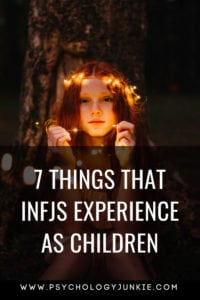
Subscribe to Our Newsletter

Want to discover more about personality type? Get the inside scoop with Susan Storm on all things typological, along with special subscriber freebies, and discounts on new eBooks and courses! Join our newsletter today!


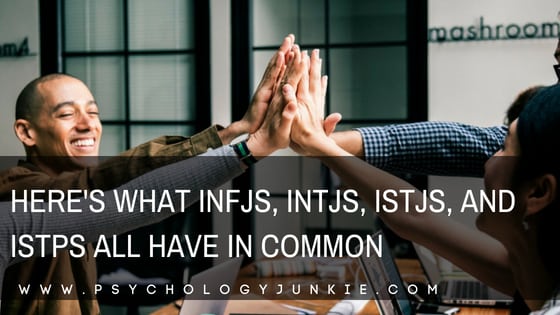

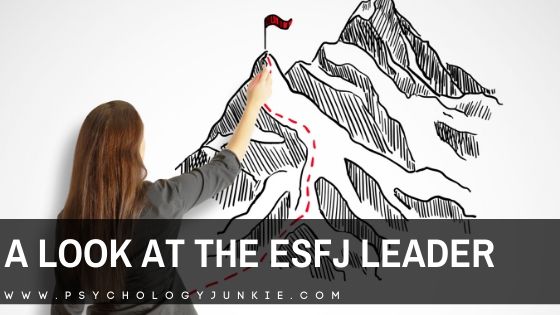


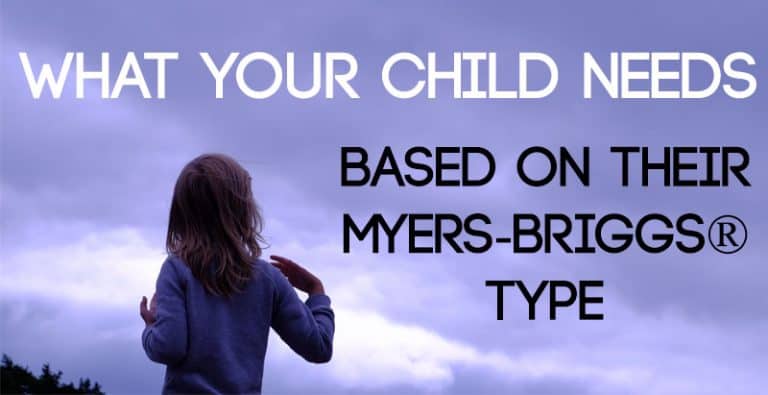
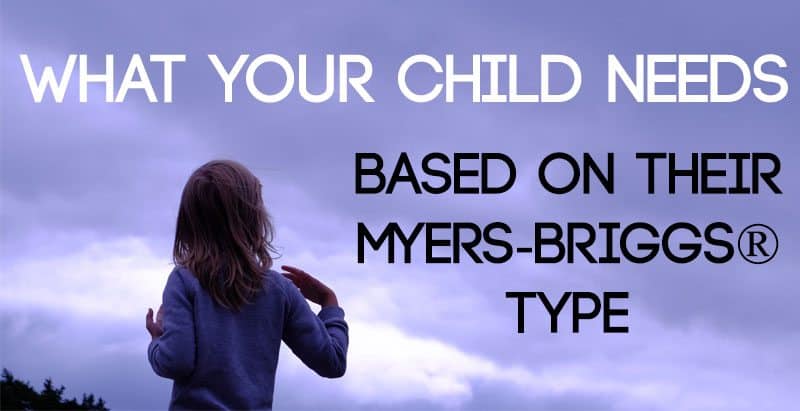


I’ve definitely felt different my entire and being a male INFJ, I never had any friends until I was 13 years old, making most of my childhood not the greatest for me mentally.
Hi Jacob, I totally get you. Likewise, I was the “odd” kid. Picked on non-stop. Like you, I formed my closest friendships in later childhood. I always felt out of place in the world from my earliest memory. I enjoyed the company of older adults , animals, solitude and the great outdoors. We INFJ’s are truly blessed and yes, likewise cursed! Fortunately, I’ve learned that it is quite fun being ME! I’ll take being called crazy/quirky any day of the week! The world needs more people like us! # INFJ’s! # Yaaaay!!! :)~
I always thought I was popular and the same as they other kids when I was young but when I look back now I realise I was actually rather odd. Since learning about my INFJ self this has made rather more sense to me but at the moment I’m still serving between celebrating myself and feeling a bit sad that my memories of my childhood have been a little distorted
I always had friends, in every phase of my life. But always only very few, some of them are still with me since primary school. I always had the ability to adapt very well to others and to feel what they feel (those who are close to me).
But I have always been a dreamer. And until I read about my personality infj I always thought I was strange. I am still sometimes in my own world where I feel as cosy and normal as in the real world. I have a huge interest in history since kindergarten because I want to know what let us/ the world/ mankind become what it is and how we can learn from the past for the future. And I am perfectionist who thinks I am not good enough. Who overthinks little mistakes for days, even as a child. It takes big effort to stop this overthinking.
I remember that my family (brother, sister and parents) and me once decided everyone should draw their dram house. Just for fun. I took much effort to draw a perfectly shaped house. Later I thought all houses were better than mine because I couldn’t bring the feeling i had inside for that house on the paper. Mine was bloodless because I just could draw “perfect” lines but not my phantasy. I was about 8 years old and cried and nobody understood why because “well, it’s nice”. I always had the feeling there is the outside world and inside world. And the inside is so much more precious, I can only show it to a few people and only in a few occasions.
Does someone understand what I mean? Someone who feels like that a bit?
I definitely understand what you mean and feel like this all the time. Thanks for sharing. It’s so reassuring to find others who think and feel as strongly as I do.
SH, yes! Your comment on the difference between inner and outer worlds is spot on for me. Inner is more precious and I feel a need to protect it. I rarely share it with others. But it is my favorite place to dwell.
Yep, this is me to a tee. I often felt isolated, had few friends who ‘got’ me. Everyone thought I was odd, even my own family even tho’ they accommodated my strangeness. Solitude and the company of animals were how I found comfort. Although I had a very active imagination but did poorly at school. The pure rote of school just slayed me. My mind worked in a wholly different way and back then there were no special schools for the likes of me. I’ve come to appreciate my empathic qualities here in later life. Still prefer the company of my four legged friends tho’.
I relate to this too much. I never understood why no one got me until I took this personality test and found out that we are less than 2% of the population. Now my years of feeling like I hold the secrets of the universe finally make sense lol
I also felt the same way , childhood wasn’t great for me while I spent total school life like this wondering and never hang out with friends , I feel lonely now but i don’t cause” i ask my self at the moment in the past what I was doing”? And now I feel that way but I think that what’s actually meant to be..what happened.. and what i was doing.. it is what i wanted . So i just let it go.
This was very relatable… Especially with not hearing someone speaking to me in the slightest, and getting in trouble for not doing as I was asked… heh. Nightmares about my baby brother falling off the bed or my cat hissing creepily at me was also incredibly unsettling, because who knew what that meant?
I also felt that, when my mom was angry, it was up to me to calm her down. When I was six, I tried to tell her I loved her whenever she got angry, but I soon stopped because it didn’t make her happy again. 🙁 I’ve had the hardest time saying “I love you” ever since, maybe because I felt rejected or insufficient.
I spent most evenings in my room by myself while my family watched television. My father was paranoid schizophrenic and alcoholic. There was a lot of domestic violence which is why I stayed away from the family, or rather away from my father. I loved to be at school and did well. Most of my friends at school were 1st generation immigrants who I have learned are also INFJs.
Intuition is strong and it’s haunting at times. When I have foreseen something and talked about it with my husband once…then a friend was talking about that person three weeks later and what happened…it was startling to him and I can’t forget the look of almost fear in his face. I don’t talk about it with people anymore.
When I was young, I thought my strong intuition must be buried as soon as it came up and to hide my strong feeling about the future. I was taught through religion that only God knows the future. I didn’t want to be cursed and doomed because I was doing something only God was supposed to be able to do. As an adult, I’ve learned that all that belittling stuff was nonsense and fully trust my intuition. My daughter even trusts my gut feelings and always calls me if she’s worried about the health of any family member.